Does a TRO Stay on Your Record?
A TRO will only appear on civil court records in most cases and will not appear on an individual’s criminal record.
 Written by Background Check Repair
Written by Background Check Repair
Criminal Records | April 29, 2024
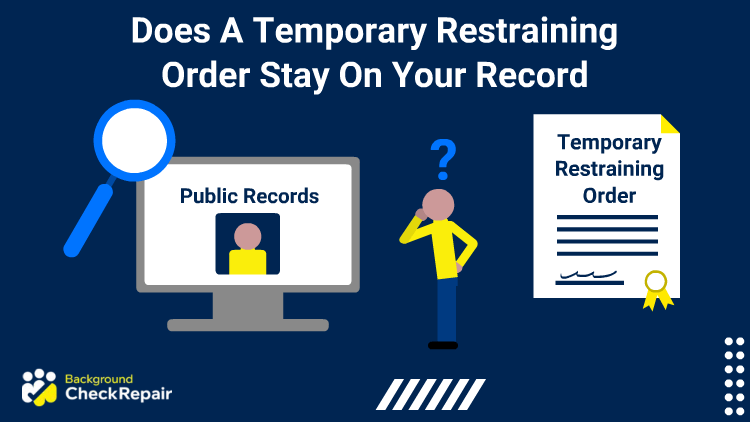
Table of Contents
Individuals who have had a restraining order filed against may be wondering how it will affect their criminal record and ask, does a temporary restraining order stay on your record?
The TRO rule or temporary restraining order rule is commonly used in courts for a short period of time before the official and permanent restraining order hearing. The TRO is used to keep the individual requesting the order safe until the order is either made permanent, or dismissed.
Whether the restraining order is temporary or permanent, it will generally not appear on an individual’s criminal record. However the matter is somewhat complicated and there are certain exceptions that individuals should be aware of.
Check your personal criminal record now to see if a temporary restraining order is listed.
The following information explains when these types of orders transfer to the public criminal record and will show up on a background check.
One of the most common questions that individuals have after a restraining order has been filed against them is, does a temporary restraining order stay on your record?
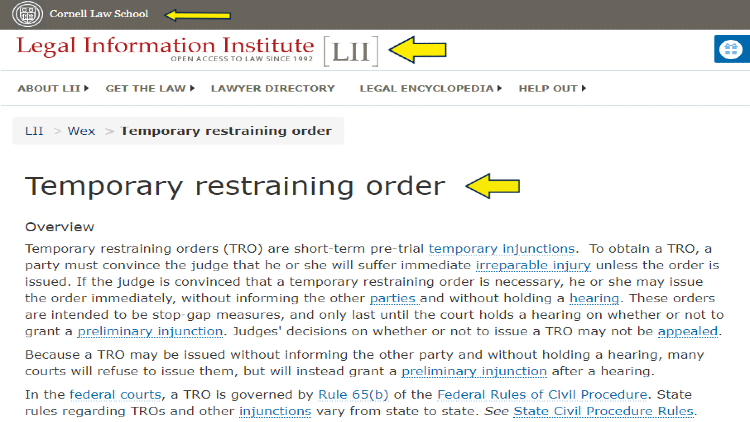
A temporary restraining order or an order of protection (in some states) is designed to keep a potential victim safe from a potential assailant.
Generally, a restraining order of any kind, whether it is permanent or temporary, will not appear on an individual’s criminal record. Having a restraining order filed against an individual is not considered a crime and there would be no reason for the order itself to appear on a criminal background check.
The main reason for this is that restraining orders are considered civil matters, rather than criminal matters. Since the entire process takes place in civil court there will be no record of the restraining order with the criminal courts, which is what is used to perform criminal history checks.
Worrying about how various legal issues will affect their background check is a valid concern. These days, it is more common than ever for employers to run thorough background checks on any potential employees. This leads many people to ask, do restraining orders stay on your record?
Generally, a restraining order hearing will take place in a civil court. Most background checks will only be interested in an individual’s criminal record which is searched using criminal court records. This means that information pertaining to civil cases rarely shows up on background checks.
However, there is still likely a public record that can be accessed if someone were to search civil court records for the individual’s name. If someone were to do this they would likely see that a civil case regarding a restraining order existed but likely not be able to see any details about the case.
Although all court records are considered public, many civil cases that deal with family matters will be confidential. Records that are considered confidential can not be fully accessed by the general public and are usually restricted to the family members involved and their respective legal representatives. Essentially, someone will be able to see that the record exists but little else.
Those wondering does a protective order go on your record? Should have little to worry about. Restraining orders and protective orders are often used interchangeably and the same rules will apply to both. Since they are most often filed in civil court there will be no indication of the order on the individual’s criminal record.
Although individuals may have been hoping for no records at all, employers will almost never perform checks of civil court records and instead will focus on criminal records.
The differences between a temporary restraining order and a permanent order can be confusing and lead many wondering: how does a temporary restraining order work?
The process is fairly simple. When an individual feels unsafe due to the actions of another individual and they want to file a restraining order against the individual they will present evidence in civil court as to why they want to file a restraining order. During this first phase, only the individual filing the order needs to be present and the individual they are filing it against may not even be aware of it.
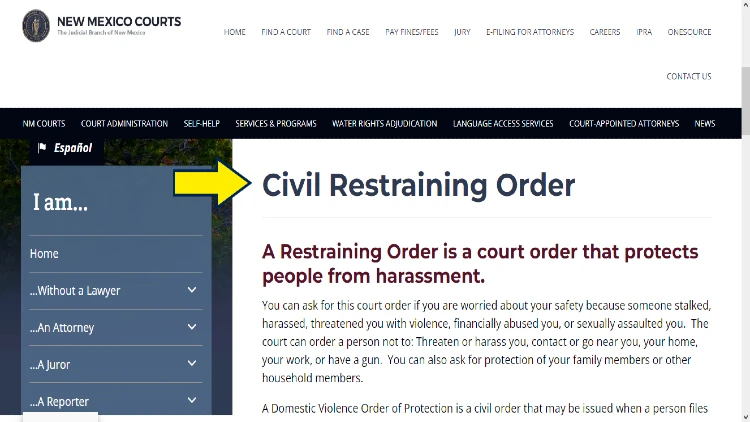
Issued as a civil order, not a criminal one, restraining orders protect people from harassment or harm until a judge can determine the elements of the situation.
If there is sufficient evidence that a restraining order may be necessary a judge will usually grant a temporary restraining order. This works like a normal restraining order in which the individual can not contact the person who filed the order or contact them, but is usually only valid for about 14 days.
After this 14-day period, the permanent restraining order hearing will take place in front of a judge in which both parties will need to be present to plead their case and then the judge will decide if granting the restraining order is justified or not.
Basically, a temporary restraining order is similar to when an individual is arrested before an arraignment hearing. Officially the individual is not guilty, but there is enough evidence available that indicates the individual is dangerous so measures are taken during the brief period of time before anything official happens.
Individuals wondering: does a temporary restraining order go on your record? Will only need to worry about the civil court records in most cases. Civil court records are available to the public but are rarely checked by background check agencies, so most individuals will have nothing to worry about.
If civil court records are a potential problem, individuals should look into local laws about the confidentiality of civil court cases and might even want to consider going through the process to get the records sealed so that they are more difficult to access for individuals not directly involved in the case.
Although they shouldn’t appear on any criminal records, some people will be wondering: how long does a temporary restraining order stay on your record? How long the restraining order is available through civil court records will depend on state record laws in most cases.
Generally, civil court records are available to the public forever. As mentioned however, many civil court records are considered confidential so the important information within these records is not very accessible to the public.
Another option for individuals concerned about these records is to look into getting the records sealed. Getting a civil court record sealed is usually easier than getting a criminal record sealed and would make it even more difficult for the public to find the records and access them.
Restraining orders normally do not go on an individual’s criminal record, however there are a few exceptions that will lead individuals to ask: when does a restraining order stay on your record?
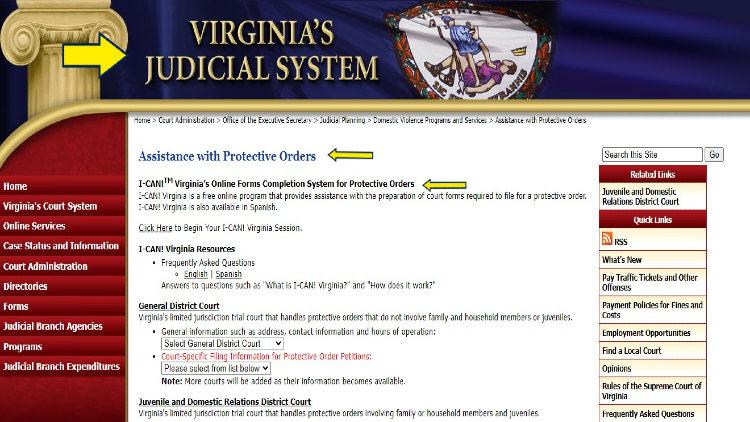
Each state’s Department of Justice will have options outlining how temporary restraining orders are handled, including how long a temporary restraining order will be on your record.
Each
As mentioned, most restraining orders are filed in civil court. However, in certain situations they may be filed in a criminal court.
In states that make a distinction between a protective order and a restraining order, a protective order will be what is filed in criminal court whereas a restraining order is a civil matter. Regardless of where they are filed or what they are called, they serve the same purpose: to separate someone from an individual that may want to harm them.
Many individuals may find themselves in a tricky situation when they are facing a restraining order for domestic violence while trying to apply for jobs.3 With so many jobs performing thorough background checks, these individuals may have questions such as: Does a domestic violence restraining order show up on a background check?
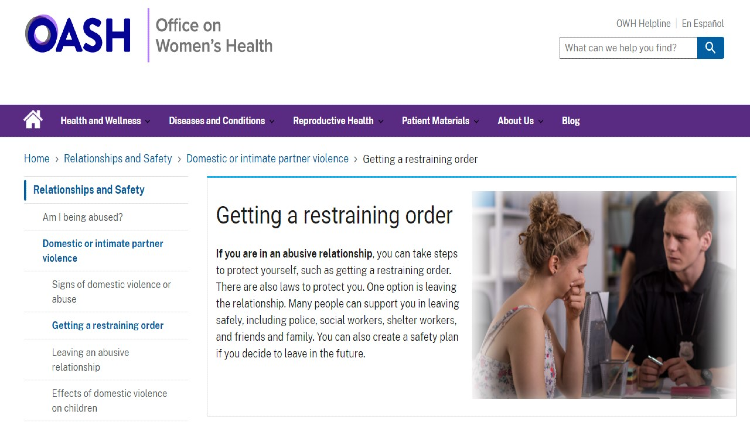
The Office of Women’s Health offers assistance is obtaining temporary restraining orders.
Domestic violence restraining orders themselves should not show up on a typical pre-employment background check. Most pre-employment background checks are performed by private background check agencies on behalf of the employer. These agencies use public online databases to perform name-based searches of the applicants and return what they find to the employer.
However, these agencies tend to charge different rates based on the kind of checks they perform so most employers will not bother paying for checks involving information that is not relevant. Because of this, most agencies will only check police and criminal court databases during the criminal history check portion of the background check. Since most restraining orders are filed in civil court, there will be no record of the restraining order.
However, if the restraining order was filed in criminal court then this information will be present on the background check. Another possibility is if the charges were filed against the individual for domestic violence. These charges would have been filed in criminal court and will show up on a background check, even if the subsequent restraining order was filed in a civil court.
Some individuals may be worried about retaliation after filing a restraining order and will have questions like: if you get a restraining order against someone will they know?
When an individual attempts to file a restraining order against someone in civil court the individual must be notified. They will be notified when the initial filing occurs and will be asked to appear in court to plead their case regarding the order. If the judge decides to grant the restraining order the individual will be notified of the specific rules of the order.
Although this may leave individuals vulnerable to retaliation, the individual must be aware of the restraining order so that they can be sure not to violate it by accident. In certain cases, an individual may not be aware of a restraining order against them, especially if it is a temporary restraining order and may violate it unknowingly. This leads to a difficult legal situation if the person was not aware that the order had been filed.
The effects of civil and criminal court cases on background checks is a major cause for concern making: do restraining orders show up on background checks? This is an extremely common question.
As mentioned, individuals who have had a restraining order filed against them in a civil court will not need to worry. Very few background checks will contain civil court information and instead will focus exclusively on criminal court information. However, if the order was filed in a criminal court, which is commonly done if the order is the result of domestic violence, then it will show up on a typical background check.
When it comes to: does a temporary restraining order stay on your record? Most TROs are filed in civil court and will never appear on a criminal record, to begin with.
Individuals who are unsure where their case was filed should perform a background check on themselves to see what shows up. Not only does this allow individuals to see what exactly is on their background check that employers will have access to, but it also allows individuals to find and fix any mistakes on their background check.
There are tons of different ways to perform a background check on yourself. One of the easiest ways is to use the search bar at the top of this page which allows individuals to perform a free public records search in just a few minutes using only their name and city.
Another option is to run a background check on yourself using an online background check service. There are tons of options available for varying prices, try out background checks for 7 days at no charge so that a check can be performed for free.
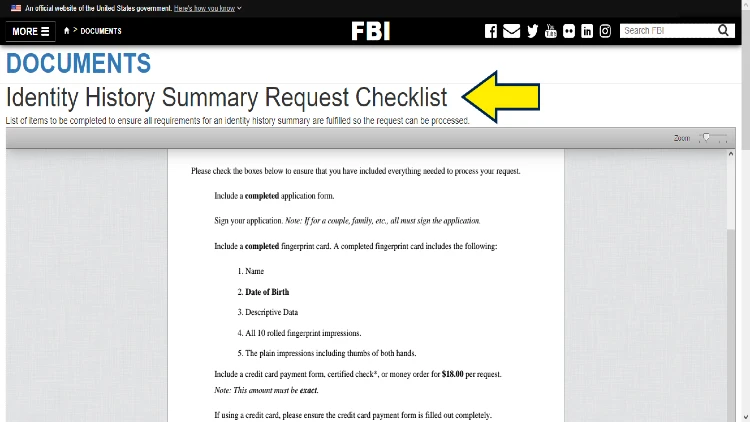
With a nationwide criminal history check, arrests that result from a violation of a temporary restraining order will appear.
Finally, individuals can also pay to have a federal background check run on themselves. This is a fingerprint-based check that is performed by the FBI and is known as an Identity History Summary Check.2 This is a great option for individuals who want the most thorough check possible and are willing to pay the fee.
Even individuals who are not currently looking for a job may be worried about how protective order will affect their current job and will be wondering: can you lose a job if you have a restraining order?
It is possible to lose your job if you have a restraining order against you. However, when this happens it will usually be a result of a criminal charge that prompted the restraining order, rather than the order itself. In general, employers will not even be aware of the order unless the employee discloses this information to them.
Another possibility is if the restraining order was filed by someone that the individual works with. In this case, showing up to work may cause the individual to violate the restraining order. In this case, it is entirely possible that the individual will be terminated by the employer.
Some individuals will have non-employment-related questions about their protective order such as: Can a restraining order prevent you from getting an apartment? Although it is possible, this is highly unlikely. Apartments may look at civil court records, but these records are likely to be confidential so the landlord will likely not know enough details to deny the individual over what they find.
Having a clean record makes many things far easier such as finding jobs or renting an apartment. Many people will want to know: can you get a restraining order removed from your record? As discussed there will only be a civil court record of the order in most cases, which individuals can petition to have sealed.
When it comes to can a restraining order disqualify you from the military? The answer is yes, but it is highly unlikely. The main concern would be if the order was the result of a domestic violence charge, as this would have a larger impact than the order itself.
Although restraining orders rarely affect employment, individuals with access to sensitive information may be impacted by a protective order. In regards to the question: will a restraining order affect my security clearance? It likely will have a large impact. The personal lives of those with security clearances are closely investigated to ensure they are trustworthy and do not have personal turmoil that can lead to security issues.
When it comes to what to expect at a restraining order hearing the process is simple. At the hearing, both individuals will have a chance to give their side of the story in regard to any events that led to the individual filing the order. Once both sides have told their side, the judge will make a decision on whether to grant the order and how it will be fulfilled such as the distance that the individual must keep as well as other forms of contact.
Many individuals in unsafe situations will want to know how to get a stay away order. Individuals should first contact an attorney if possible to help them through the process. However many states have forms that can be filled out to help individuals through the process, such as the Colorado Court form for how to obtain a restraining order.1
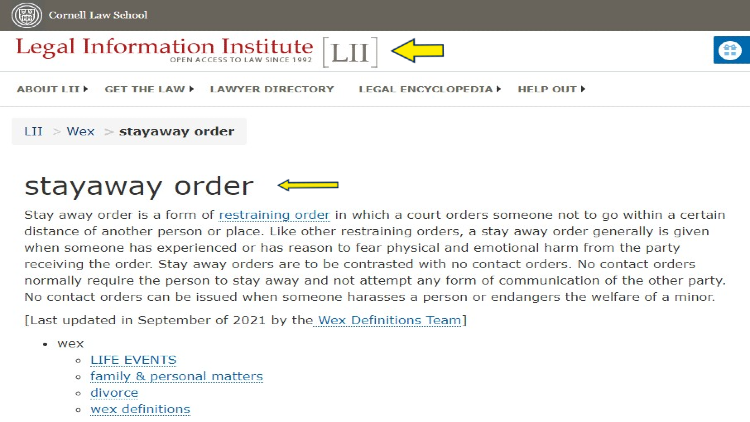
A stay away order dictates the distance a person must stay away from the victim, and is usually issued when imminent danger is a possibility.
Having a restraining order filed against you can be a stressful situation that may have long-term effects on the person’s life. However individuals wondering: does a temporary restraining order stay on your record? should not need to worry as employers rarely check civil court records.
A TRO will only appear on civil court records in most cases and will not appear on an individual’s criminal record.
Only restraining orders filed in criminal court will appear on background check. However, most restraining orders are filed in civil court.
The search box at the top of this page can be used by anyone who wants to run a verification of restraining order status.
Most states allow for individuals to motion for a restraining order to be lifted or modified after a specified amount of time has passed. The amount of time will vary from state to state.
Criminal charges of any kind will remain on an individual’s record forever unless they are sealed or automatically removed due to state law.
Shoplifting charges will stay on your record indefinitely in most states. However if the charge did not result in a conviction, then it will usually be possible to have the records sealed.
People worry about the information that appears on their records and one of the things to be aware of is when does a harassment order get documented. A harassment order will go on your record if the order was filed in criminal court instead of a civil court.
Restraining orders are usually considered civil matters and are not considered criminal charges.
For individuals who are wondering how long is a restraining order retained on your record, a restraining order will not appear on criminal records in most cases. The civil record will be available indefinitely unless sealed.
1Colorado Judicial Branch. (2022). General Information Before You File Your Complaint/Motion. Instructions for Obtaining a Civil Protection Order. Retrieved October 27, 2022, from <https://www.courts.state.co.us/Forms/PDF/JDF%20400%20Instructions%20for%20Obtaining%20a%20Civil%20Protection%20Order.pdf>
2Federal Bureau of Investigation. (2022). Identity History Summary Checks (Rap Sheets). How We Can Help You. Retrieved October 27, 2022, from <https://www.fbi.gov/how-we-can-help-you/need-an-fbi-service-or-more-information/identity-history-summary-checks>
3U.S. Department of Justice. (2022). Domestic Violence. Office on Violence Against Women (OVW). Retrieved October 27, 2022, from <https://www.justice.gov/ovw/domestic-violence>
We use cookies to ensure that we give you the best experience on our website. If you continue to use this site we will assume that you are happy with it